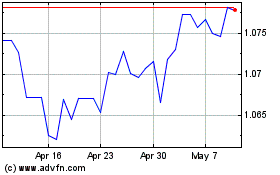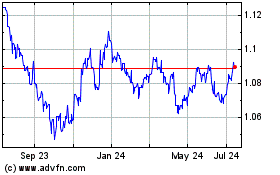Yen Extends Gains
January 25 2015 - 11:57PM
RTTF2
The Japanese yen extended its gains against the other major
currencies in the Asian session on Monday amid a rise in risk
aversion following the left-wing Syriza party sweeping polls in the
weekend snap elections, igniting worries that Greece may exit the
eurozone.
Meanwhile, data released by the Ministry of Finance showed that
Japan's trade deficit came in at JPY 660.7 billion in December,
less than the JPY 735.2 billion expected by economists. Exports
climbed more than expected and imports also rose solidly.
Minutes of the Bank of Japan January monetary policy showed that
majority of the members agreed that the drop in oil prices will
affect the economy and inflation positively in the long-term,
though it is expected to weigh on inflation in the short-term.
Meanwhile, Asian stocks also traded lower amid fears of a
possible exit of Greece from the eurozone, after the anti-austerity
Syriza party emerged victorious in the Greek snap elections. In
addition, these reports have raised concerns that Greece could
abandon its budget constraints, amid heightening fears of a Greece
exit.
The Japanese benchmark Nikkei 225 index is currently down 0.61
percent or 107.25 points at 17,404.
Last Friday, the yen rose 2.04 percent against the euro, 0.73
percent against the pound, 1.78 percent against the Swiss franc and
0.63 percent against the U.S. dollar.
In the Asian trading today, the yen rose to nearly a 1-1/2-year
high of 130.13 against the euro and nearly a 3-month high of 175.73
against the pound, from last Friday's closing quotes of 131.89 and
176.51, respectively. If the yen extends its uptrend, it is likely
to find resistance around 127.00 against the euro and 176.60
against the pound.
The yen, which ended Friday's deals at 133.30 against the Swiss
franc and 117.72 against the U.S. dollar appreciated to a 10-day
high of 132.87 and a 4-day high of 117.25, respectively. The yen
may test resistance near 114.40 against the Swiss franc and 115.75
against the U.S. dollar.
Against the Australia, the Canada and the New Zealand dollars,
the yen strengthened to a 3-1/2-month high of 92.16, more than a
3-month high of 94.10 and a 3-month high of 86.83 from last week's
closing quotes of 93.08, 94.75 and 87.75, respectively. On the
upside, 91.00 against the aussie, 93.50 against the loonie and
86.00 against the kiwi are seen as the next resistance levels for
the yen.
Meanwhile, the euro dropped against the other major currencies
in the Asian session on Monday, as the anti-austerity Syriza party
emerged victorious in the Greek elections Sunday, but may fall shy
of an absolute majority in the 300-seat parliament and need some
outside support.
The euro fell to 1.1096 against the U.S. dollar for the first
time since March, 2003. At last week's close, the euro was trading
at 1.1203 against the greenback. If the euro extends its downtrend,
it is likely to find support around the 1.09 area.
Against the pound, the euro slipped to 7-year low of 0.7403 from
Friday's closing quote of 0.7473. On the downside, 0.73 is seen as
the next support level for the euro.
The euro edged down to 0.9782 against the Swiss franc, from last
week's closing quote of 0.9857. The euro may test support near the
0.96 region.
Looking ahead, the German IFO business climate index for January
and U.K. BBA mortgage approvals for December are due to be released
in the European session.
At 9:00 am ET, Eurozone finance ministers hold a meeting to
discuss a range of financial issues in Brussels.
The Australian and New Zealand markets are closed for the
Australia Day and Auckland Anniversary holidays, respectively.
Euro vs US Dollar (FX:EURUSD)
Forex Chart
From Mar 2024 to Apr 2024

Euro vs US Dollar (FX:EURUSD)
Forex Chart
From Apr 2023 to Apr 2024
